| Srl | Item |
| 1 |
ID:
168462
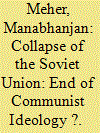

|
|
|
|
|
| Summary/Abstract |
The collapse of the Soviet Union was portrayed as end of communist ideology but it was in fact the distorted form of socialism, not the Marxian socialism of the dictatorship of the proletariat based on classes and class struggle which Marx has envisaged. The anti-Marxist-Leninist viewpoints of the Khrushchev under the mask of De-Stalinisation during 20th Congress of the CPSU marked the departure from fundamentals of Marxism.
|
|
|
|
|
|
|
|
|
|
|
|
|
|
|
|
| 2 |
ID:
169809
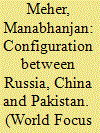

|
|
|
|
|
| Summary/Abstract |
The shift in Russian policy towards Pakistan and its close cooperation with China has alarmed policymakers and strategic community in India. It is also acknowledged that Russia has supported the position of India in UNSC closed-door meeting, which rejects attempts by third countries or international organizations to participate in resolving the Kashmir issue, was in favour of a settlement in bilateral negotiation. The paper suggests that India along with Russia can probably engage both China and Pakistan in a various multilateral forum such as RIC and SCO.
|
|
|
|
|
|
|
|
|
|
|
|
|
|
|
|
| 3 |
ID:
150554
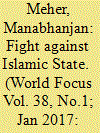

|
|
|
|
|
| Summary/Abstract |
Terrorism does not recognize borders and takes more and more inhuman forms spreading over new areas. Fight against international terrorism is one of the important national and foreign policy issue for Russia. The Russian Federation has been in the very center of the fight against this evil for the last two decades. On various occasion the policy makers in Russia stressed a ‘compressive approach’ associated with improvement of socio-economic conditions of the people to deal the terrorism.
|
|
|
|
|
|
|
|
|
|
|
|
|
|
|
|
| 4 |
ID:
169429
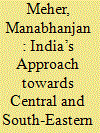

|
|
|
|
|
| Summary/Abstract |
The Central and South-eastern Europe has recently occupied an important place in India’s foreign policy discourse. India’s approach to the region is based on historical, and deep-rooted in civilizational-cultural values as well as shared common views on various global issues. The erstwhile ‘Eastern Bloc’ was a friendly area for India with significant political, economic, cultural and defence ties. Most of the countries in the region endorse India’s case to become a full-fledged member of the Nuclear Suppliers Group and a permanent seat in the UN Security Council.
|
|
|
|
|
|
|
|
|
|
|
|
|
|
|
|
| 5 |
ID:
154999
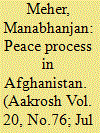

|
|
|
| 6 |
ID:
159947
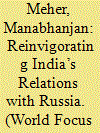

|
|
|
|
|
| Summary/Abstract |
The relationship between India and Russia was elevated to that of a Special and Privileged Strategic Partnership in 2010. The recent Summit in Sochi attempts to address the grievances of both the countries about the divergent national positions on international politics. The paper argues that only through consolidation of bilateral relations and addressing with each other’s apprehensions could be the way on building multipolar world order.
|
|
|
|
|
|
|
|
|
|
|
|
|
|
|
|
| 7 |
ID:
175991
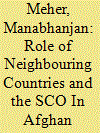

|
|
|
|
|
| Summary/Abstract |
Even more than a decade after the overthrow of the Taliban regime by the US forces, Afghanistan remains acountry mired in armed conflict. Afghanistan’s neighbours are all stakeholders in regional stability. The SCOmember and observer states believed that the security of Central Asia, China and Russia was inextricablylinked to the prospects of the peace process in Afghanistan. Its active involvement in the Afghan peace processis one of the SCO’s major successes.
|
|
|
|
|
|
|
|
|
|
|
|
|
|
|
|
| 8 |
ID:
178413
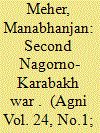

|
|
|
| 9 |
ID:
162990
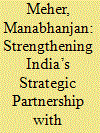

|
|
|
|
|
| Summary/Abstract |
The opening of Chabahar Port as well as India’s accession to Ashgabat Agreement would further diversify India’s connectivity options with Central Asia. A strong strategic partnership between India and Uzbekistan is most important to India’s engagement with Central Asia. Relations between two countries are distinguished by the high level of bilateral cooperation based on the long history of share common values and civilisations links.
|
|
|
|
|
|
|
|
|
|
|
|
|
|
|
|
| 10 |
ID:
146760
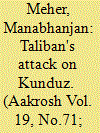

|
|
|
| 11 |
ID:
145372
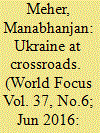

|
|
|
|
|
| Summary/Abstract |
Signed a year ago on February 11-12, 2015 the Minsk Accords (Minsk-II) which brought together the leaders of Germany, France, Ukraine and Russia, commonly referred to as the Normandy Quartet. The accords were signed by the Contact Group consisting of representatives from Ukraine, Russia and the self-proclaimed Donetsk and Lugansk republics with the plan to defuse the armed conflict in the east of Ukraine.
|
|
|
|
|
|
|
|
|
|
|
|
|
|
|
|